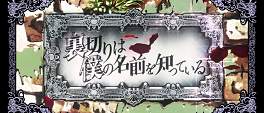



You'd be forgiven for recalling Aerosmith's "Dude Looks Like a Lady" in the opening credits of the voluminously titled Uragiri wa Boku no Namae wo Shitteiru; not for the song's namesake but because were it not for the obvious breasts, the lady would certainly resemble a gentleman. This is not surprising with an art style that revels in the androgynous, emblematic of a genre commonly characterised by male homosexual romances. Nothing in the opening episodes attempts to dispel this association, in many ways it revels in it with the liberal use of tropes that are keen to imply rather than extol. Despite the genre trappings however, the opening episodes are a muted but disappointing introduction to a series which while not widely accessible, plays to its strengths despite the ultimately derivative result of doing so.
women who are attentive, graceful and the only bright lights in a world populated by frowns and stoic metrosexual manliness
Yuki is an orphan, found abandoned in a hedge with only his name affixed to him, growing up feeling that he was unwanted by his parents. It doesn't help that he has the ability to see people's pasts and emotions with only a touch, making him increasingly isolated despite his looks earning him scores of adoring fans. Yuki's life is shaken up when his supposed half-brother makes an appearance and his ability to read other's emotions spins into overdrive, manifesting the unfortunate ability to shatter all glass around him. The sibling, Takashiro, seems to be involved was mysterious silver-eyed man, Zess, who saves Yuki when a classmate takes a deadly interest in him. Yuki's ability may yet come to have some greater significance and his life shows no indication of settling back down.
Read the rest of this entry




In the first three episodes of Hakuouki - Shinsengumi Kitan, activities are split evenly between: smouldering with masculinity while lounging around in a den of exposed chests, or looking doe eyed and getting saved by gentlemen heroically cutting up other gentlemen. Building on the romance game source, its target audience is plain to see, however the female protagonist at the centre of this bevy of testosterone is so bland that it's tricky not to see her as an empty husk of a character, aimed to cover a myriad of Mary Sue paradigms. To its credit, the swords and scheming is interesting if not entirely unoriginal and the supernatural undertones of the opening scenes are left mostly unexplored. The most telling aspect however is Studio Deen's involvement which despite a solid if lacklustre start, bodes ill for the remainder of the series.
an aesthetically muted, vocally competent but generally uninspiring tale of a young girl with a missing father caught up in a bloody battle for stability in feudal Japan
Chizuru Yukimura is a long way from home, after her father came to Kyoto for his work he disappeared; she followed only to be caught up in a common street scuffle. Members of the Shinsengumi, a local vigilante group, defeat her pursuers and take her into their custody claiming she may need to be killed if she is found to have witnessed their fight. It transpires however that her search for her father, a doctor, coincides with the mission they have been tasked with after his disappearance. As Chizuru begins to ingratiate herself with the group, she becomes involved with the Shinsengumi's battle against a group rebelling against the ruling class; an successful attack is launched on their headquarters in which she plays a pivotal role. Her time with the group may have only just begun but they may be the best way for her to find out what has happened to her father.
Read the rest of this entry







